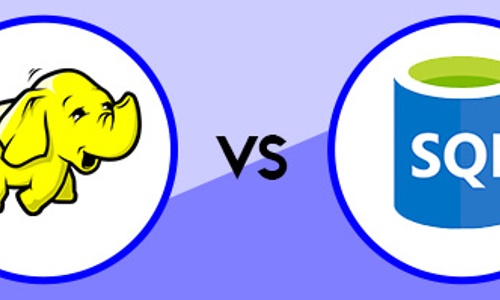The key differences between Hadoop vs. SQL:
- Architecture: Hadoop is an open-source framework (or "ecosystem") that distributes data sets across computer/server clusters and processes data in parallel. SQL is a domain-specific programming language used to handle data in relational databases.
- Data: Hadoop writes data once; SQL writes data multiple times. (Hadoop and SQL read data multiple times.)
- Skill level: Hadoop is much harder to learn than SQL. (However, both require knowledge of code.)
- Price: Hadoop and SQL are open-source and free to use. However, both incur additional set-up and maintenance costs.
- Reviews: Hadoop has a customer score of 4.3/5 on the software review website G2.com. Because SQL is a programming language and not available as a "product," it has no score on G2.
Organizations rely on big data to power their business, but many teams struggle with the complexities of data management. Thankfully, Hadoop and SQL handle large data sets more efficiently. These tools manage data in unique ways, which makes it difficult for us to compare them on a like-for-like basis. However, organizations looking to streamline their tech stacks might have reason to choose one over the other.
In this article, we compared Hadoop vs. SQL based on several factors, including features and customer review scores.
Features Overview
|
Hadoop |
SQL |
|
|
User scores on G2.com |
4.3/5 |
N/A |
|
Price |
Free (open-source) |
Free (open-source) |
|
Language |
Java (primarily) |
SQL |
|
Schema structure |
Dynamic |
Static |
|
Scaling |
Linear |
Non-linear |
|
Skill level required |
Advanced |
Intermediate |
What is Hadoop?
Apache Hadoop is an ecosystem of open-source tools that store data sets in distributed systems and solve various data management issues.
Four components make up Hadoop: MapReduce, Yarn, libraries, and, ultimately, the Hadoop Distributed File System (HDFS), which runs on off-the-shelf hardware. Hadoop handles all kinds of data sets, making it a superb choice for organizations that want to generate valuable data insights from lots of sources. It's good for handling vast amounts of data.
Hadoop carries out distributed processing for data sets across computer and server clusters. It processes data in a parallel fashion, so it works on more than one machine simultaneously. HDFS stores submitted data, MapReduce processes the data, and Yarn divides data management tasks.
Some of the world's most successful technology organizations use Hadoop, including IBM, Pivotal Software, Hadapt, and Amazon Web Services.
For more information on Integrate.io's native Hadoop HDFS connector, visit our Integration page.
Related Reading: What is Apache Hadoop?
What is SQL?
Structured Query Language (SQL) is an open-source domain-specific programming language for data management and processing data streams in a relational database management system (RDMS) such as Oracle, SQL Server, or MySQL. Developed by Oracle, SQL is a declarative language for analytical queries.
For more information on our native SQL connectors, visit our Integrations page.
Hadoop vs. SQL: What are the Differences?
Perhaps the greatest difference between Hadoop and SQL is the way these tools manage and integrate data. SQL can only handle limited data sets such as relational data and struggles with more complex sets. Hadoop can process large data sets and unstructured data.
Of course, there are many other differences as well:
- Hadoop scales linearly; SQL is non-linear.
- Hadoop is low integrity; SQL is high integrity.
- Hadoop can only write once; SQL writes multiple times.
- Hadoop has a dynamic schema structure; SQL has a static schema structure.
- Hadoop supports batch processing (via HDFS); SQL doesn't.
- Hadoop is much harder to learn than SQL, but easier to scale. You can add data nodes to Hadoop clusters easily.
The tool you choose depends on the data sets you want to manage. If you need to work with large amounts of data, opt for Hadoop. If you don't want the complexities of advanced data management, opt for SQL.
There is an alternative to both tools. Integrate.io, a cloud-based platform, uses the ETL framework to manage complex data sets and, unlike Hadoop and SQL, requires no code. This data integration alternative comes with out-of-the-box integrations for databases, cloud services, and more.
Support and Training
Hadoop
- Community
- Documentation
- Mailing lists
- Part of the Apache Software Foundation
SQL
- No official training, but various third-party modules and training exist
Pricing
Hadoop
As an open-source platform, Hadoop is completely free. However, users need to factor in the cost of Hadoop clusters that perform parallel tasks on data sets. The cost of these clusters depends on disk capabilities, with a typical node costing $1,000-2,000 per TB.
SQL
As an open-source platform, SQL is completely free. But this is only part of the story. SQL requires additional set-up and technology costs, namely an RDMS that uses the SQL language. At the enterprise level, this can cost thousands of dollars a year.
Conclusion
Hadoop and SQL both manage data, but in different ways. Hadoop is a framework of software components, while SQL is a programming language. For big data, both tools have pros and cons. Hadoop handles larger data sets but only writes data once. SQL is easier to use but more difficult to scale. In the end, the right tool for your company depends on what type of data your company handles, and how much you want to invest in training.
If you are looking for a big data alternative, Integrate.io provides you with a reliable ETL solution that streamlines data processing in your organization. Click here for a demo or 14-day pilot.








